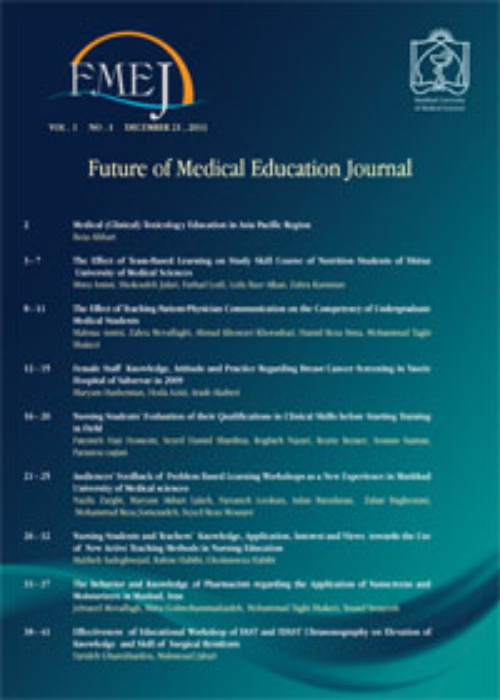Curriculum Development in regard to Illicit Drug Abuse
Author(s):
Abstract:
Background
Illicit drug use is widely different among various societies. To date, no national curricula have been developed for medical students. To develop a community- oriented course for illicit drug use a preliminary need assessment as well as knowledge, attitude and performance of health care staff were performed. Methods
All personnel of Sarakhs Health Network were studied in 2011. A constract questionnaire was developed and validated. Results
The mean (SD) age of participants (n=185) was 32 (7.4) years with equal numbrs of males and females. “Family problems” (Likert Scale: 137), “having an addict friend” (135) and “low determination” (133) were the most common expressed reasons for starting drug use. The most effective people in helping addicts reported to be family (151), friends (148), and Narcotics Anonymous Group (NA) (147). “Admission in hospital” (110), “staying in rehabilitation camp” (102) and “Methadone Maintenance Therapy” (101) were stated as the most effective treatment methods. Males selected these items more than females (p=0.032). “Lack of family support” (151), “presence of an addict family member or friend” (149), and “craving” (148) were the effective factors for failure. “Family support” (160), “distance from addicts” (157), and “friendly help network” (156) were the most important factors in staying off the drugs after treatment. Females selected these items more than males (p=0.03). From health care staff perspectives “Methamphetamine” (157), “Heroin” (156) and “Opium” (149) were the most addictive drugs. The most common sources for participants’ information were TV and radio (65.4%). Conclusions
Knowledge-related biological reasons of addiction and abstinence are limited among health workers, and sometimes misleading. Misperceptions and deviated knowledge and their attitude should be focused in curriculum development for health and medical educational courses.Keywords:
Language:
English
Published:
Future of Medical Education Journal, Volume:2 Issue: 2, Jun 2012
Page:
31
https://magiran.com/p1030063
دانلود و مطالعه متن این مقاله با یکی از روشهای زیر امکان پذیر است:
اشتراک شخصی
با عضویت و پرداخت آنلاین حق اشتراک یکساله به مبلغ 1,390,000ريال میتوانید 70 عنوان مطلب دانلود کنید!
اشتراک سازمانی
به کتابخانه دانشگاه یا محل کار خود پیشنهاد کنید تا اشتراک سازمانی این پایگاه را برای دسترسی نامحدود همه کاربران به متن مطالب تهیه نمایند!
توجه!
- حق عضویت دریافتی صرف حمایت از نشریات عضو و نگهداری، تکمیل و توسعه مگیران میشود.
- پرداخت حق اشتراک و دانلود مقالات اجازه بازنشر آن در سایر رسانههای چاپی و دیجیتال را به کاربر نمیدهد.
In order to view content subscription is required
Personal subscription
Subscribe magiran.com for 70 € euros via PayPal and download 70 articles during a year.
Organization subscription
Please contact us to subscribe your university or library for unlimited access!


